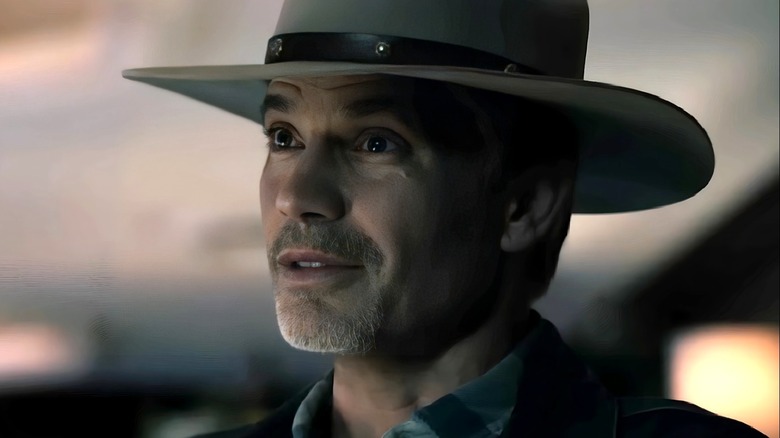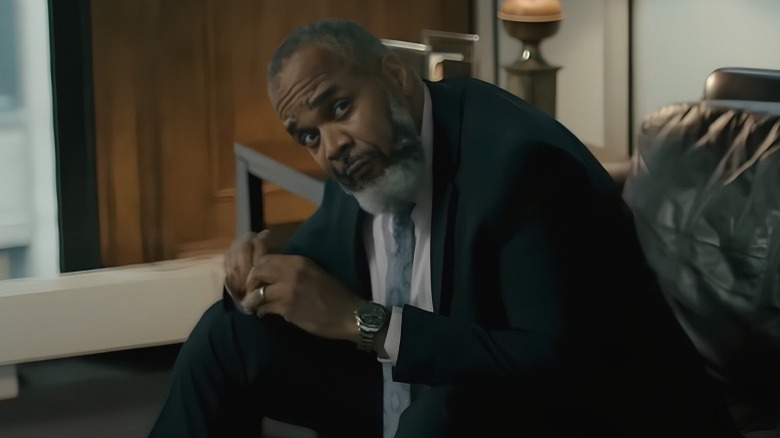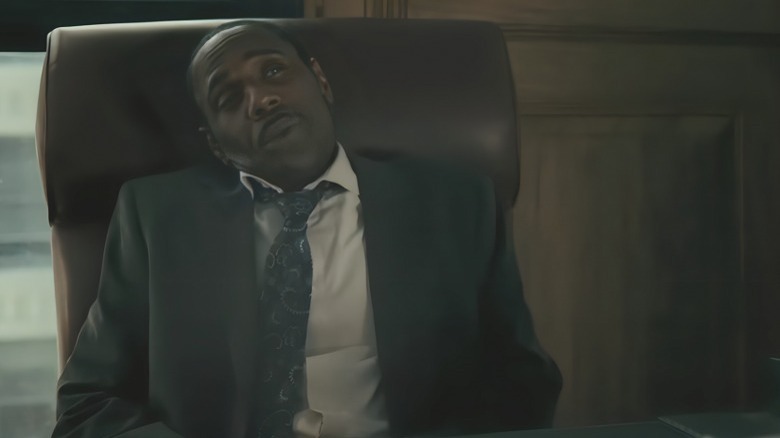Justified: City Primeval Reckons With Raylan's Legacy & White Privilege
For six seasons, "Justified" was one of the best, if not the best, cop show on television. With four near-perfect seasons and two others that were still very good despite their flaws, it's no wonder that the FX crime drama sits at a stellar 97% on Rotten Tomatoes.
While fans were no doubt overjoyed by the news that Timothy Olyphant would be putting that iconic Stetson on one more time for "Justified: City Primeval," FX actually casts a shadow over Raylan Givens' legacy in a unique way by setting the series in Detroit, a city known for its majority Black population. With this in mind, being that the conversation around law enforcement has changed substantially over the last few years due to the Black Lives Matter movement, this sequel series has some murkier waters to wade into as a result.
With Raylan, of course, being a white U.S. Marshall, one of the most interesting things about "Justified: City Primeval" is how it reckons with his legacy and the social changes that have happened since the show wrapped up back in 2015. While the FX show could have easily played it safe by simply alluding to the BLM movement a couple of times, this revival instead decides to go deeper and is especially relevant as a result.
City Primeval asks some hard questions about law enforcement
One of the most pivotal moments of reckoning comes in the third episode of the miniseries when Raylan is talking to Black attorney Carolyn Wilder (Aunjanue Ellis-Taylor). He casually mentions how he beat Clement Mansell (Boyd Holbrook) in public after the criminal threatened his daughter. As Carolyn points out, however, he, as a white man and an officer of the law, is uniquely disposed to break rules like that without fear of consequences.
Though Raylan is generally quick with a quip of his own, he is immediately struck silent by his sudden realization of his white privilege and how those who lack it distrust law enforcement as a general rule because of this disparity. While Raylan's routine oversteps of the law throughout "Justified" are generally seen as the impetus for the show's title, many Black characters in "Justified: City Primeval" point out how the system was rigged against them from the beginning and how officers like him deciding what's right erodes trust in law enforcement institutions.
Carolyn's ex, Jamal (Amin Joseph), even calls her out for cozying up to Raylan as the miniseries goes on, pointing out how the police have been behind countless injustices for the people of color in Detroit. Furthermore, this element is doubled down upon as "Justified: City Primeval" continues toward its inevitable conclusion.
The miniseries forces Raylan Givens to accept police corruption
Throughout "Justified: City Primeval," we see and hear references to cops bending or outright breaking the rules in order to get the job done. While Norbert (Norbert Leo Butz) speaks casually with Raylan about the frame-ups that he's done in the past to get a conviction, it's actually the much more sympathetic Maureen Downey (Marin Ireland) who is shown to be the dirtiest cop in the squad.
In fact, when Raylan trusts Maureen enough to give her the murder weapon that killed Judge Alvin Guy (Keith David), she instead tries to use it to convict a young Hispanic man of the crime. Ultimately, it is seemingly this series of increasingly conflicting events that actually sees Raylan quitting the U.S. Marshals in the final episode.
In a sense, this might be the greatest victory of "Justified: City Primeval." Not only does it depict Black characters on both sides of the law sympathetically and relatably, but it also sees its central character eventually losing faith in the institution that has defined so much of his life.
Even though the conclusion leaves things open for more, if it ultimately ends here, "City Primeval" is pretty much a perfect send-off for Raylan Givens, and perhaps even better than the one he received at the end of the previous series.


